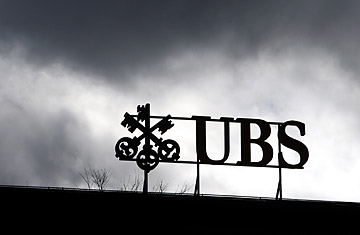
Swiss banking giant UBS takes its name from the first initials of the company's original moniker Union Bank of Switzerland. But over the past few months the Swiss have begun to joke that the acronym should stand for United Bandits of Switzerland. Fury over a tax scandal and massive losses thanks to UBS's exposure to the toxic subprime market in the U.S. is growing fast. "Those arrogant and greedy bankers are tarnishing our image," says Marie-Claire Favre between sips of her cappuccino in a Lausanne cafe. Standing in front of UBS's Lausanne office, Bernard Thevenoz can't hide his outrage. "Those thugs, they are dragging our country through the mud," the octogenarian hisses, waving his cane towards the palatial building. "How can we ever regain our dignity?"
Banks are the backbone of Switzerland's economy, accounting for 12% of national GDP, and for decades they have been central to the Swiss view of themselves. But the past few months have not been good for the industry, and in particular UBS, which has been under a cloud since last summer. That was when news broke that U.S. authorities were investigating the world's largest manager of private wealth for its role in helping rich Americans hide $200 billion in undisclosed offshore accounts to avoid taxes. Last month UBS agreed to pay the U.S. a $780 million penalty to absolve itself of criminal fraud charges. It also agreed to release the names of 250 clients whom the U.S. suspects of evading taxes. Two weeks ago, as UBS shares plummeted to a new low, the bank's chief executive Marcel Rohner resigned. All that and the bank recently announced a $17 billion loss, the biggest in Swiss corporate history. (See pictures of the global financial crisis.)
All that news does not please the fiscally conservative and risk-averse Swiss. A $60 billion government rescue package for banks wasn't too welcome, either. Nor was UBS's announcement that it will pay out an estimated $1.77 billion in bonuses this year. As Zurich's daily newspaper, Tages-Anzeiger, observed, "Mr. and Mrs. Swiss will never understand that."
They don't. "It's a disgrace," says Favre, a retired teacher who is planning to withdraw her investments from UBS when they come to term this summer. "We always believed our country and institutions were superior to anyone else's because they were honest and transparent. But this makes me think we are really no different and no better, so it's time we got off our high horse."
That's a sentiment that chimes with UBS shareholder Thomas Minder. "To say that I and many other shareholders lost confidence in UBS would be an understatement," says the CEO of Trybol, a small cosmetics company in the town of Neuhausen. At this point, I am not surprised by anything they do."
Financial analysts say those strong feelings are beginning to translate into financial decision making. The number of UBS customers closing their accounts is on the rise. Panagiotis Spiliopoulos, head of investment banking research at Switzerland's Vontobel bank, estimates that $15-20 billion in domestic funds were moved from UBS to smaller banks in recent months. In normal times, one bank expert says, withdrawals would be next to nothing. "We are fed up because UBS has betrayed all the values that make us uniquely Swiss: fiscal responsibility, stability and international credibility," says Samuel Bretholz, a Geneva sociology student who is writing a thesis about the banks' impact on society. "No wonder our perception of ourselves as decent people has taken a beating."
Credit Suisse, Switzerland's second largest bank, posted a $7 billion loss in 2008 and slashed thousands of jobs. But so far it has not suffered from the loss of client confidence that UBS faces. The biggest winners are small banks because "they keep their noses clean and stay out of the United States," Bretholz says. "The Swiss want their money to be safe, and they can no longer find security in big banks that operate internationally and are exposed to global risks."
Prompted by the tax evasion scandal, the Swiss are now in the middle of a national re-examination of banking industry regulations. An increasing number of voices are speaking up against banking secrecy, which, under the current law, can only be lifted if a client is suspected of defrauding tax authorities, rather than merely not declaring all assets. Recent polls show that 56% of Swiss now support helping foreign countries identify tax evaders, up from just 20% last year. Even some ministers and bankers agree that changes to the 75-year-old law might be necessary to avoid continued pressure from abroad. "The fact that the Swiss no longer fervently defend this treasured tradition also shows a change in how they view the banking industry now," Bretholz says. "They don't want to be seen as a nation that hides other people's money."
But whether the current uproar will permanently tarnish the citizens' image of their country or diminish the confidence in the banking sector remains to be seen. "Right now, everybody is upset because UBS messed up," says Georg Lutz, a political scientist at Lausanne's Foundation for Research in Social Sciences. But Lutz points out that the Swiss had rebounded from scandals and corporate downfalls before, such as the controversy in the 1990s surrounding the dormant Holocaust bank accounts, or the collapse, in 2001, of Switzerland's former national airline. "At that time we were upset too, but we got over it and moved on," Lutz says. "So in the end the UBS fiasco will not have a lasting negative effect on the national psyche."
Perhaps. For now, though, Swiss citizens have decided that their financial institutions are no longer something they can bank on. In Switzerland, that's revolutionary.
